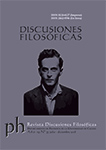Authors
Abstract
This paper explores a solution to the problem of a narrowing of the scope of immunity to error through misidentification. It is the challenge of leaving out propioception-based self-ascriptions, among others. In Coliva’s framework, these judgments are immune because there is not an identification as part of the thinker’s rational grounds. The problem is that there seems to be judgments without any significant immunity which also satisfy Coliva’s criterion. Here I propose that, in spite of appearances, these challenging cases do involve an identification from the rational perspective of the thinker. However, such an identification is not the premise of a conscious inference but an implicit reason a thinker would appeal to if he were requested to justify his final judgment.
Keywords:
References
Cappelen, Herman and Josh Dever. The Inessential Indexical. On the Philosophical Insignificance of Perspective and the First Person. Oxford: Oxford University Press, 2013. Print.
Coliva, Annalisa. “Error through misidentification: some varieties”. The Journal of Philosophy.103 (8), 2006: 403-425. Print.
---. “Which ‘key to all mytologies’ about the self? A note on where the illusions of transcendence come from and how to resist them”.
Immunity to Error through Misidentification. Eds. S. Prosser and F. Recanati, Cambridge: Cambridge University Press, 2012. 22-45. Print.
---. “Stopping points: ‘I’, immunity and the real guarantee”. Inquiry. 60 (3). 2017: 233-252. Print.
Evans, Gareth. The Varieties of Reference. Oxford: Clarendon Press, 1982. Print.
García-Carpintero, Manuel. “De se thoughts and immunity to error through misidentification”, Synthese. 2015 [DOI: 10.1007/s11229-015-0817-y]
---. Relatar lo ocurrido como invención. Una introducción a la filosofía de la ficción contemporánea. Madrid: Cátedra, 2016. Impreso.
Guillot, Marie. “The limits of selflessness: semantic relativism and the epistemology of de se thoughts”. Synthese.190, 2013: 1793-1816. Print.
Martin, Michael. “Bodily awareness: a sense of ownership”. The Body and the Self. Eds. J.L. Bermúdez, J.L. Marcel and N. Eilan. Cambridge Mass.: The MIT Press, 1995. 267-290. Print.
McGlynn, Aidan. “Immunity to error through misidentification and the epistemology of de se thought”. About Oneself: De Se Thought and Communication. Eds. M. García-Carpintero and S. Torre. Oxford: Oxford University Press, 2016. 25-55. Print.
O’Brien, Lucy. Self-Knowing Agents. Oxford: Oxford University Press, 2007. Print.
Peacocke, Christopher. The Mirror of the World. Subjects, Consciousness, and Self-Consciousness. Oxford: Oxford University Press, 2014. Print.
Recanati, Francois. El significado literal. Madrid: Antonio Machado Libros, 2006. Impreso.
Wright, Crispin. “Reflections on F. Recanati ‘Immunity to error through misidentification: what it is and where it comes from’”. Immunity to Error through Misidentification. Eds. S. Prosser and F. Recanati. Cambridge: Cambridge University Press, 2012. 247-280. Print.

 pdf (Español (España))
pdf (Español (España))
 FLIP
FLIP

























